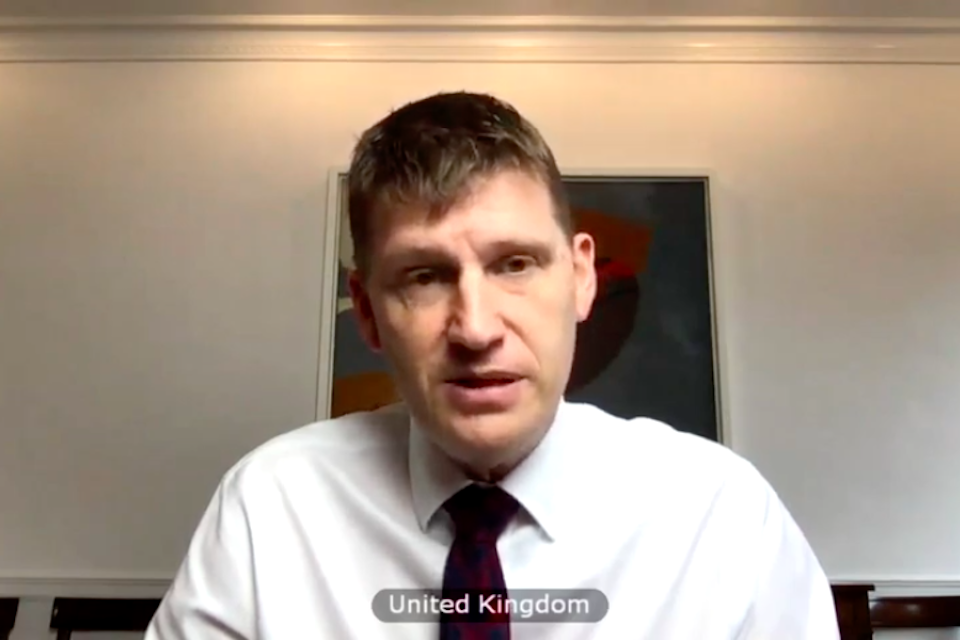The need for a political settlement to solve the crisis in Syria
Statement by Ambassador Jonathan Allen, UK Chargé d’Affaires to the UN, at the Security Council briefing on the situation in Syria

Thank you very much, Mr President. Let me also thank Special Envoy Pedersen and Under-Secretary-General Lowcock for their briefings today. We once again express our full support for their tireless work on Syria and commend the ongoing efforts of UN actors to address the needs of the Syrian people in dire circumstances on the ground.
I am also grateful to the humanitarian co-penholders for the statement delivered by the Belgian ambassador. And I want to agree with him that we should ensure that we focus separately on the humanitarian situation going forward in our programme of work.
Mr President, let me also at the outset express some concern about reports of a significant Russian airstrike on opposition fighters in Idlib province yesterday. This appears to be the largest single attack in Idlib since the 5 March ceasefire came into effect. And we call on all parties, particularly the principal actors, to refrain from escalatory actions which risk undermining the fragile ceasefire.
Mr President, this Friday, 30 October, marks one year since the Constitutional Committee first convened. When it was first launched, this Council expressed its determination, in our PRST of 8 October 2019, that this would be the beginning of the political process to end the conflict in line with resolution 2254 that met the legitimate aspirations of all Syrians.
But since 30 October, the Committee has convened on only two further occasions - once in November 2019 and once in August this year. In that time, not only has no substantial progress made, it appears that it remains difficult even to get the regime to agree to attend meetings. This month should have seen a further round of talks, and we regret that the regime’s insistence on an agenda not in line with the Committee’s mandate has meant this has not happened.
Without a new constitution, free and fair elections with all Syrians, including members of the diaspora, eligible to participate, cannot take place as envisaged in resolution 2254. Elections which do not meet these requirements will deny millions of Syrians the opportunity to take part in deciding the future of Syria and to share in ownership of the political process as endorsed by this Council.
Mr President, there unfortunately appears to be an equal lack of progress on other aspects of UNSCR 2254. The release of arbitrarily detained persons has not happened in any meaningful number, despite the Security Council’s and the United Nations’ continued calls. And the conditions for the safe and voluntary return of refugees have not yet been met, not least because the regime continues to threaten the security of returnees. On this I want to echo the remarks of my United States colleague and to say that the United Kingdom will not attend any conference, especially in a non-neutral location such as Damascus, which intentionally ignores this fundamental requirement, and which denies the participation of those whose return it purports to discuss.
Mr President, it is clear that humanitarian assistance still does not reach those in need. The Secretary-General’s report of 20 October makes clear that nearly two-thirds of healthcare facilities in North East Syria, which depended on cross-border aid, have not been reached by cross-line aid in 2020. We commend the UN’s efforts in north west Syria, including urgent road repairs and scaling up the Bab al Hawa operation, to help reduce the damage caused by the needless removal of Bab Al Salam from the cross-border aid resolution. That aid access is desperately needed. Most of the almost one million people who fled the Russian-backed regime offensive on Idlib last winter are still displaced, living in squalid makeshift camps. And as November nears, the Secretary-General’s report confirms that 3.1 million people require additional winterisation support. News of fuel shortages, which delayed aid convoys in Homs and Hama in September, are of grave concern as temperatures drop.
We are also still deeply concerned about the impact of COVID-19 in Syria. Water is urgently needed, including in Al Bab, to enable the good hygiene that helps prevent this disease from spreading. And healthcare facilities are necessary to treat those affected. Some are already unable to absorb all suspected COVID cases. The United Kingdom has committed £33 million ($43.1 million) additionally to address COVID-19 in Syria. But the 24 attacks this year affecting healthcare and killing 13 health workers only add to the pressure and worsen the humanitarian situation.
Mr President, these attacks highlight again – if we needed it to be highlighted again – the need for a political settlement, in line with resolution 2254, to resolve the crisis. So let me end by urging all those with influence in Damascus to press the regime to engage meaningfully.
Thank you, Mr President.